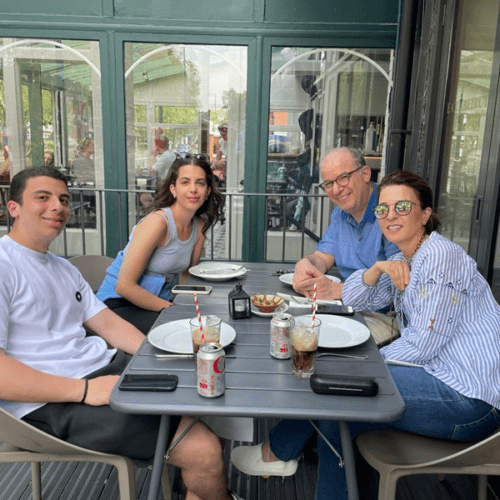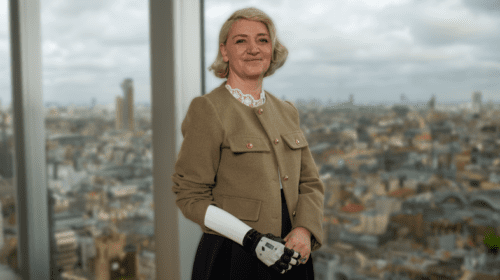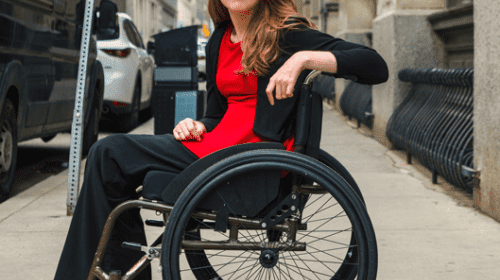This is my fourth article for OILWOMAN Magazine, and I am thrilled at the opportunity to interview Fuzzy Bitar! Fuzzy has acted as a mentor and sounding board for me, and I have really valued our chats in recent months at bp’s headquarters in London. I am delighted to share some of his story today.
Angela McKane (on arriving at Fuzzy’s office): Fuzzy, thank you so much for your time this morning! Hey, do you want a coffee?
(Reader, it is important to note at this point that the coffee served up in bp’s St. James Square office is energizing and delicious, especially when whipped up by Mo, our very own barista! I have arrived at Fuzzy’s office already cradling a cup of the creamy, caffeinated cup of champions.)
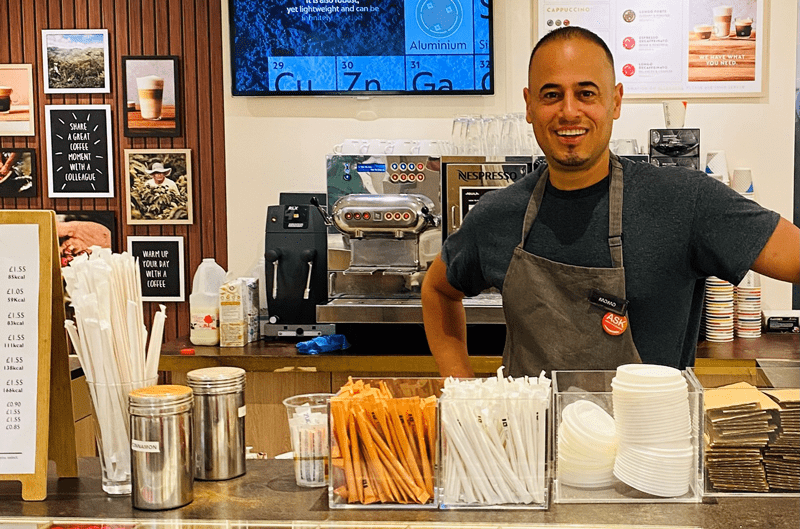
Fuzzy Bitar (laughing): No. I’m good, I’ve had one – thank you!
AM: Okay, I’ll sit here and drink this and would love to hear a little about your life so far – where it all began in your early years?
FB: Well, I was born in Saudi Arabia. However, I am originally Palestinian; both my parents are from Jaffa. My father was sponsored by the UN. He studied at Cambridge University here in the U.K. and then he went to work for the World Health Organization (WHO), and as a result of that we [lived] all over the world. We went from Saudi Arabia to Nigeria, emigrated to the U.S., back to the Middle East again, Lebanon and then Jordan. My father was an airline executive as well as a speechwriter. He actually wrote a few speeches for the late King Hussein of Jordan! At the age of 11, I went to boarding school here in the U.K. and I stayed through to university where I studied mining engineering.
After graduating, I was due to work in South Africa and had a job offer lined up. My father was an avid reader of a magazine called Vital Speeches of the Day. It was 1988, and the then Chairman of bp, Robert Horton, had given a speech to graduating students at the University of Colorado, in which he said that the attributes he liked to see in people were stamina, commitment, and to care about good work – as well as the ability to laugh and sing!
My father suggested I write to him as, at this point, I’d [applied to] and been rejected by bp multiple times. In fact, I’d been applying to bp all over the world – and eventually they had responded with a letter that said, “Stop applying to bp!” I thought about it and decided to act on my father’s advice. I wrote the Chairman a very concise letter, straight to the point. I said to him, “Look, I read and enjoyed your speech. I believe I answer to the attributes you postulated, and I am ready to accept the challenge of a role with bp!” A few days later, I was called for multiple interviews and assessments and, sure enough, I was offered a job. I’ve since had the chance to work with bp all over the world, including South America, Azerbaijan, Egypt, Indonesia, the U.K. and the U.S.
AM: EXCELLENT! This makes me smile. What was that first job with bp?
FB: I started in Dimlington Terminal in Hull in the U.K., then I worked offshore as an operator in the southern North Sea on the Cleeton Platform. I did that for around two years before progressing to many other roles globally. I really loved working offshore; I wanted to get my sleeves rolled up and get my hands dirty! I often speak to graduates today and I tell them nothing beats hands-on experience; get it as early as you can in your career. I spent much of my career journey working at bp sites, and I have really treasured that. You build this connection and understanding of the equipment that makes it possible to deliver energy to the world, but also how that equipment is connected to and operated by people, working each day to make it all possible. You really develop some humility because you are working with people who are so experienced and from whom you can really learn a huge amount. If you embrace that, then you emerge so much stronger. It hones your instincts as well. That extensive early experience across sites means I can enter an operations site now and immediately discern and gauge how well it is run: You can tell from the smell of the place.
AM: I’m enthralled thinking of all these different places and cultures where you’ve had the opportunity to live and work. Do you have a favorite?
FB: Well, I shared a flat in Houston with Bernard Looney along the way, some decades ago now. The Texas sun was shining on us; we were young and having the time of our lives!
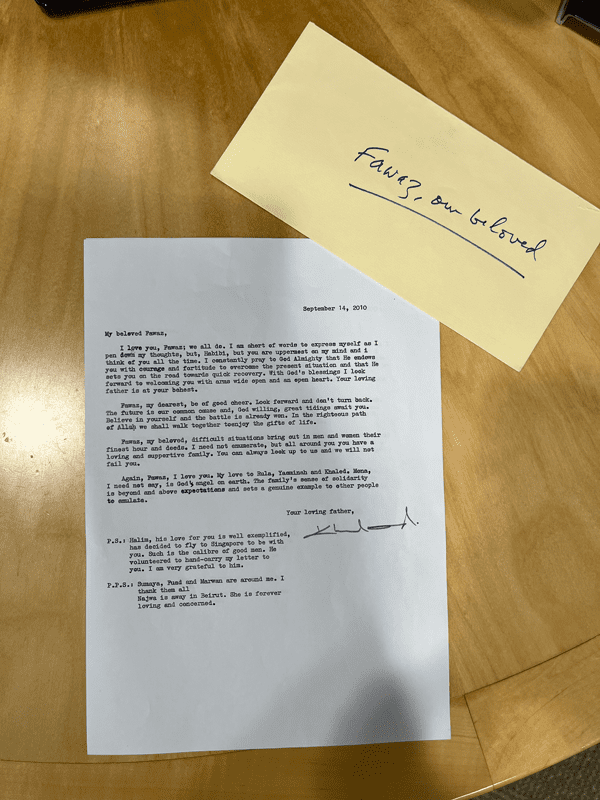
AM: I adore Houston, I love the people, and I love the restaurants. I discovered jalapeno-stuffed shrimp there during my last visit.
FB: Ha, ha – great! It’s so hard to pick a favorite. I also loved living in Azerbaijan, which I did for four years, then I had a wonderful four years in Egypt, as well, not to mention the subsequent three years in Indonesia. It’s been a dream come true to simply immerse myself in all these cultures. They were each so different, and yet they matched the different stages of my life. They are all my favorites! Also, I have learned so much from each of the places I’ve lived and worked including languages. In addition to English, I am a fluent Arabic speaker, and quite proficient in Spanish.
AM: I think that’s really beautiful. Do you go back and visit some of the places you’ve lived?
FB: Oh, sure! In fact, I was in Azerbaijan just a few weeks ago, and I’ve been back to Indonesia. I would really love to go back to Colombia. Along with London, Jordan is very much home for me and my family. I think I have passed on the enjoyment of travel to my kids as well. Both my daughter, Yasmina, and son, Khaled, love to see the world. They care about our world, our planet, very much.
AM: It truly is an amazing career journey, and I feel like I can imagine globetrotting just listening along! How did all this eventually lead to the role that you now hold?
FB: Well, I was quite unusual in that I stuck to my core discipline (operations) along the way. I trained in process engineering with bp, and I stayed in operations for the duration of my career, even though we were encouraged in those days to also explore roles that would be more commercial or subsurface. Rather than broaden in this way, I instead built real depth in operations – and subsequently found my skill set to be in very high demand following the Gulf of Mexico Macondo incident. Soon after, we created an operations function, and I was appointed the Global Head of Operations for bp – a role I held for eight years. I was focused on stabilizing operations and transforming our performance.
More recently, I was Chief of Staff to Bernard [Looney] as he took up post as CEO and was then appointed to my current role as Senior Vice President – Health, Safety, Environment and Carbon. I love the role as I am learning every day. Continuous learning is the key to career fulfillment, as is being able to both learn from and pass on learning to others. I’ve really been living that, as I also completed a Doctorate of Engineering from Aberdeen University in 2020 and I am now an Honorary Professor in the School of Engineering. I believe there is a real magic created when academia and industry come together.
AM: Ah… along with Houston, Aberdeen is up there as one of my much loved cities! Fuzzy, with such a career filled with thrilling adventure and travel, it is sobering to consider that you also had to endure a very serious accident and injury as a result. Would you be willing to share some of the story of what happened?
FB: Yes, the year was 2010, and I’d been working in Indonesia at the Tangguh LNG Gas Plant. I was on holiday in Bali with my family, and I was body surfing with my son when an incredibly huge, surprising and totally out-of-the-blue wave appeared and tossed me up and slammed me down to the seafloor with incredible might. I experienced the sensation of drowning, right down to the last breath; it’s true what people say about your life flashing in front of you. Fortunately – though extremely frightening for her – my wife, Rula, saw what was happening and, with the help of some tourists, managed to get me out of the water and back onto the beach.
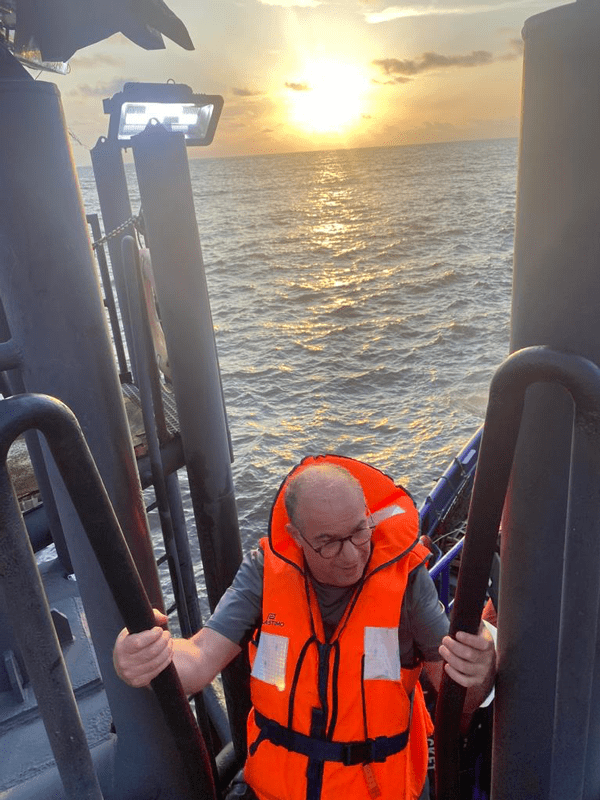
However, once conscious again I realized I could not move at all. When the wave hit me, it had caused a disc in my neck to pull away at full force and damage my spinal cord. My family managed to get some help and I was taken to an International SOS clinic, and from there an air ambulance took me to Singapore with a doctor by my side. I was in the Intensive Care Unit (ICU) for six weeks under continuous monitoring and care. It was deeply concerning as my heart rate dropped very low and I remained unable to move. Furthermore, I developed blood clots in my lungs, and contracted pneumonia. I was in pain, I felt terrible, and it was an extreme endurance test.
Even when I managed to make it from the ICU to the High Dependency Unit, I was in a really bad way, and I couldn’t move at all for months. I didn’t know at this stage if I would ever get any movement back, and my kids had to move school to be close to me. It was thought that at the very least there was a good chance I would never walk again.
Once strong enough to endure the journey, I was then transported by air ambulance to London, where I stayed in a rehabilitation center for almost a year. I underwent multiple surgeries coupled with neurological monitoring and physiotherapy. It was a long journey, but in time I began to feel some strength and muscle function return, first working my way up to being able to use a wheelchair to get around. As well as my family, friends would visit and make me smile!
As I started to show signs of progress, the physiotherapy got even more intense – 8 a.m. to 5 p.m. each day, every day, focused on walking, movement and building strength. Sometimes we used water; there was a hydro-pool in the hospital. Water can help soothe and carry your body to some extent as you do the exercises, but it was still hard graft. Through excellent care and support from my family, I made good progress and indeed I now walk again. But, I have been left with some lasting impacts and have sought to readjust my life to accommodate these.
AM: Could you share a little on what these are?
FB: Well, I often have to manage pain and discomfort. Sometimes it’s pretty constant, and when it’s like that I’ve realized I can have a shorter fuse and become impatient, and I’ll start to fidget. I tried some meds to help with the pain, but I didn’t like the side effects, so now I do without these. I find it hard to sleep for any length of time, maybe a few hours a night, and so I will take a sleeping pill once a week to catch up. I’ve adapted our family home – I have a lift for the stairs – and I continue with physiotherapy and have a personal trainer. For some actions, I rely a lot on mirrors to observe what I am doing. I have lost some sensation in my hands and so I need to be really careful with hot water or plates that may be not long out of the oven. I did also have to give up some of the things I loved before, such as playing the piano and horse riding, though I am still able to enjoy a good cigar! When I look back today, I do so positively, as I have learned so much about life and what’s important.
AM: What was it like going back to work following this experience?
FB: Oh, I still remember my first day back! I approached a taxi in London, and every time I got close to the door the driver would pull away and drive a little further forward. He kept doing it and when I finally reached him to question this, he thought I was drunk from the way I’d been walking. That was a rude awakening into the assumptions people can make if they observe something about you that they perceive to be different.
Thankfully though, my colleagues and team members were truly wonderful and supportive. In fact, if I were to share any perspectives from all this, one would be: Don’t wait for a terrible accident to remind you how much your family, friends and loved ones matter, and that they are on hand to help, and you can help them in return. This is a learning that can also be applied at work. On a human level, we simply need each other!
I try to remember this and to foster a supportive leadership style in my work as a result. It is important to value what seem like the simple things in life. When it comes down to it, they are often what truly matters. Love really matters. You cannot control what happens to you in life, but you can control how you respond. Developing mental fortitude is a practice. I had to work on it in the journey of rehabilitation in [the] hospital and with just as much effort as I worked on my physical rehabilitation. Seeing this happen to me was extremely frightening for my family, and my kids had to embark on their own journey of dealing with some ongoing anxiety in the aftermath.
The immediate impact of this happening to me came as a real shock for my parents, who were in Jordan at the time. I was at a low ebb in intensive care in Singapore, but I received a beautiful letter from my father, written out on an old typewriter. In that letter he said, “Believe in yourself, and the battle is already won.” I felt these words were my father bestowing strength on me – his son. These words gave me the strength to fight for my life, to find my inner resolve to go on. My father has passed on now. I think of him often. I am so proud to be his son, and thankful for those words which still help me each day. If there is one final learning from all this to share, it is: Choose your words carefully. They have lasting impact. Strength, knowledge, love and wisdom – all can be passed through the generations.
Check out the video, Moment of Impact, the story of Fuzzy’s accident and recovery.
Headline photo: The Bitar family: son Khaled, daughter Yasmina, Fuzzy and his wife, Rula. Photos courtesy of Fuzzy Bitar.
Angela McKane works with early-stage startups focused on developing solutions across the defense, transport and energy sectors. Prior to this McKane was VP Technology Insights at bp, where she grew and led a global team for over a decade, delivering actionable insights on emerging technology innovations and investment opportunities to teams across the Group. Earlier in her career, McKane worked at Transport for London (“TfL”) and, prior to that, she worked at her alma mater, the University of Glasgow. McKane is a regular speaker at industry leading conferences including Gastech, CERAweek and more. Connect with McKane onLinkedIn.
Oil and gas operations are commonly found in remote locations far from company headquarters. Now, it's possible to monitor pump operations, collate and analyze seismic data, and track employees around the world from almost anywhere. Whether employees are in the office or in the field, the internet and related applications enable a greater multidirectional flow of information – and control – than ever before.

